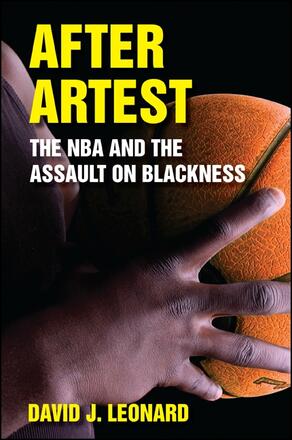
After Artest
The NBA and the Assault on Blackness
Alternative formats available from:
Explores how the NBA moved to govern black players and the expression of blackness after the “Palace Brawl” of 2004.
Description
On November 19, 2004, a fight between NBA players Ron Artest and Ben Wallace escalated into a melee involving several other players and many fans. The "Palace Brawl," writes David J. Leonard, was a seminal event, one that dramatically altered outside perceptions of the sport. With commentators decrying the hip hop or gangsta culture of players, the blackness of the NBA was both highlighted and disdained. This was a harsh blow to the league's narrative of colorblindness long cultivated by Commissioner David Stern and powerfully embodied in the beloved figure of Michael Jordan. As Leonard demonstrates, the league viewed this moment as a threat needing intervention, quickly adopting policies to govern black players and prevent them from embracing styles and personas associated with blackness. This fascinating book discloses connections between the NBA's discourse and the broader discourse of antiblack racism. Particular policy changes that seemed aimed at black players, such as the NBA dress code and the debate over a minimum age requirement, are explored.
David J. Leonard is Associate Professor of Critical Culture, Gender, and Race Studies at Washington State University and the author of Screens Fade to Black: Contemporary African American Cinema. He is also the coeditor (with C. Richard King) of Commodified and Criminalized: New Racism and African Americans in Contemporary Sports and of Visual Economies of/in Motion: Sport and Film.
Reviews
"…if you're like most fans of basketball, it's just also the case that you're not typically thinking about whether you're watching the largest, most indelible symbol of systematic racial oppression in America—but you are. Or so says David J. Leonard, approximately, in this startlingly thorough scope of zeitgeist, for the western nation so sprawling and divided it can hardly be called one … [a] superb book. " — Newcity Lit
"In After Artest, David Leonard confirms why he is one of the sharpest minds writing about race and sports in America today. Race is serious business and no one understands better than Leonard how that extends to the arenas and stadiums that have long been the site of confrontation between black bodies and spectators. " — Mark Anthony Neal, author of New Black Man
"David Leonard offers an incisive analysis of race, in a league defined by race, thus adding meaningful dialogue and a sharp perspective to conversations about the ever-evolving image of the NBA in the post-Jordan era. Though haters will undoubtedly try to call a technical foul, Leonard goes hard in the paint nonetheless, shining another light on the always complicated racial politics that continue to inform the game of basketball. " — Dr. Todd Boyd, the Katherine and Frank Price Endowed Chair for the Study of Race and Popular Culture in the University of Southern California School of Cinematic Arts
"The power of the event is that it changes everything. So it is, David Leonard demonstrates in After Artest, in the post-Palace NBA. When Ron Artest went into the stands in the Palace of Auburn Hills in that fateful game in 2004, he not only subjected himself to unprecedented punishment, he also altered the entire discourse of race in the NBA. After Artest offers a critique not only of the NBA's new modes of policing blackness, but it brings to light—and to life—that combustible encounter between 'new racism' and postracism in contemporary America. Racial politics, sociology, the nasty underside of America's history, and sport are brought together forcefully by Leonard in After Artest. " — Grant Farred, author of What's My Name? Black Vernacular Intellectuals and Long Distance Love: A Passion for Football
"After Artest breathes new life into the critical scholarship on sporting-based racial representation, and that of the NBA more specifically, by fleshing out the key political sites and struggles of the post-Artest moment. Leonard's combination of rigorous empirical command and nuanced theoretical interpretation generates a compelling and insightful analysis. " — David L. Andrews, editor of Michael Jordan, Inc. : Corporate Sport, Media Culture, and Late Modern America